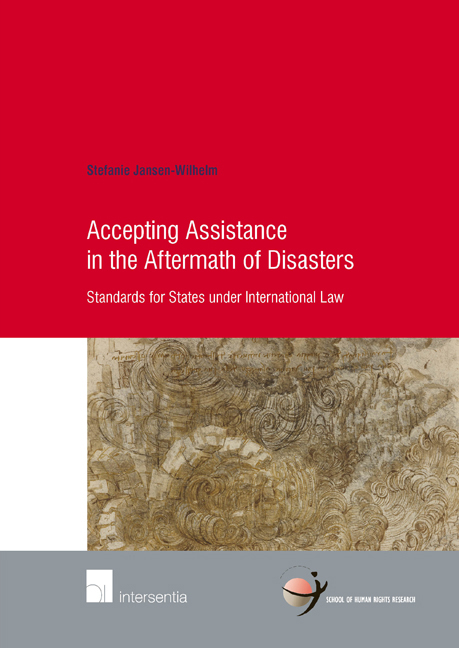Book contents
- Frontmatter
- Dedication
- Acknowledgements
- Contents
- List of Abbreviations
- Part I
- Part II
- Chapter IV The Content and Meaning of Article 2(1) ICESCR
- Chapter V Applying the ICESCR on Disaster Situations: Specific Obligations
- Chapter VI Final Conclusions
- Summary
- Bibliography
- Index
- Curriculum Vitae
- School of Human Rights Research Series
Chapter IV - The Content and Meaning of Article 2(1) ICESCR
from Part II
Published online by Cambridge University Press: 12 December 2017
- Frontmatter
- Dedication
- Acknowledgements
- Contents
- List of Abbreviations
- Part I
- Part II
- Chapter IV The Content and Meaning of Article 2(1) ICESCR
- Chapter V Applying the ICESCR on Disaster Situations: Specific Obligations
- Chapter VI Final Conclusions
- Summary
- Bibliography
- Index
- Curriculum Vitae
- School of Human Rights Research Series
Summary
INTRODUCTION
When analysing the instruments and documents that potentially contain rules on accepting international humanitarian assistance in response to disasters in Chapter II, it was explored how human rights standards could play a role in disaster response. At that point the question has been addressed to what extent human rights standards in disaster settings have correlative obligations for states eventually resulting in an obligation to accept humanitarian assistance if the state is unable to realize the human rights standards. In general, the standard-setting function of human rights law can help to concretize obligations for state parties immediately after a disaster, but in particular the ICESCR appears to give direction on accepting humanitarian assistance. The ICESCR contains a provision on the general obligations for state parties that could help to answer the question at what point an affected state is under an obligation to accept. Article 2(1) of the ICESCR tells state parties to come to the full realization of the rights ‘individually and through international assistance and cooperation’. In addition, each state party must use ‘the maximum of its available resources’. These general obligations must be read in conjunction with substantive rights, of which the ICESCR contains a number highly relevant in disaster settings, like the rights to housing, food, water and health.
With the help of the ICESCR, it will be considered whether the legal framework as identified in the previous Chapters can be foreseen of more concrete standards. Possibly, the inclusion of the ICESCR will result in a clearer delineation of the primary role of the affected state, indicating when the affected state should move on to triggering international humanitarian assistance. Moreover, the obligations stemming from the ICESCR may be useful for determining when the point is reached at which the affected state must give its consent to international assistance, for example by giving standards to determine when the national capacity is exceeded, or by giving concrete obligations that can be violated by refusing to accept assistance. Accordingly, the ICESCR will be used to formulate a more complete answer to the main research question.
- Type
- Chapter
- Information
- Accepting Assistance in the Aftermath of DisastersStandards for States under International Law, pp. 121 - 152Publisher: IntersentiaPrint publication year: 2015
- 1
- Cited by

